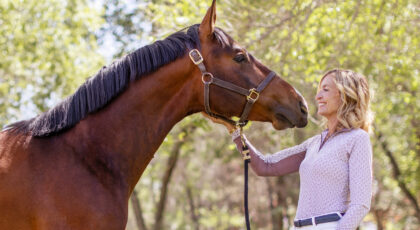Horses are beautiful, powerful, intelligent, and fun. Unfortunately, they are also expensive.
Owning a horse comes with a sea of bills from the vet, the farrier, the tack shop, the feed store, etc. With 62.7% of American’s now living in cities (according to the US Census Bureau), most also face boarding costs, which can vary from cheap, do-it-yourself pasture board in some of the central states ($150–$400 per month) to full-care stall board in California and the East Coast ($500–$2,000+ per month).
Rising costs, stagnant incomes, and the loss of farmland all contribute to the fact that many of America’s horse-lovers are decidedly horseless. What’s a horse-crazy, cash-poor person to do? Below are some creative ways to stay involved with horses without the expense of ownership.
Read, Read, Read!

©Hung Thai/Flickr CC by 2.0
Reading is one of the easiest—and cheapest—ways to learn about horses and there’s no shortage of material. General horse magazines, such as Horse Illustrated or Equus, are perfect for the casual reader, while breed or discipline-specific magazines cater to niche audiences. There are also a wide range of conformation and horse care manuals available.
For adult readers of nonfiction, books like The Nature of Horses: Exploring Equine Evolution, Intelligence, and Behavior by Stephen Budiansky, offer in-depth knowledge of horses. For those who appreciate nonfiction with a storyline, equine biographies, such as Laura Hillenbrand’s Seabiscuit: An American Legend, are highly recommended.
And then, of course, there are the countless novels. While many are geared toward children—Black Beauty, the Black Stallion, King of the Wind—there are plenty of adult novels that feature horses, such as Jaimy Gordon’s Lord of Misrule or any number of Dick Francis books. Horses (or horse-like creatures) also feature prominently in such fantasy works as Peter S. Beagle’s the Last Unicorn, C.S. Lewis’ The Horse and His Boy, and Kristen Britain’s Green Rider series.
Sometimes a book is all you need to get your horse fix.
Volunteer at a Rescue

Want direct human-to-horse contact? Being a volunteer is a free, fun, and rewarding way to stay in touch with horses. But be prepared to work! Horse rescues aren’t looking for people to feed carrots to ponies. They need people who will clean water buckets, muck stalls, raise funds, and handle horses with limited training.
To that end, choose a rescue wisely. A reputable rescue doesn’t take in more horses than it can feed or house its horses in unsafe environments (barbed wire fences and dilapidated barns are a bad sign). A good horse rescue will be clean, safe, transparent, and registered as a 501(c)3 nonprofit organization. For example, Red Bucket Equine Rescue in Chino Hills, California. (Find others at the Global Federation of Animal Sanctuaries.)
Volunteer at a Horse Show

©Wilson Hui/Flickr CC by 2.0
Spruce Meadows is the number one ranked horse park in North America, according to the North American Riders Association. Playing no small role in that achievement is the 500-odd volunteers who help out during tournaments. At Spruce Meadows they’re known as the Pegasus Club, but just about every large event will have their own version—the Olympics included! Check out the website of equine events near you to find out how you can take part.
Take Lessons

©Alex Carlton
Riding lessons are a tried and true method for getting involved with horses, especially for people who live in densely populated areas. Many cities have equestrian centers, such as Los Angeles Equestrian Center, that are home to trainers in a variety of disciplines. Equestrians in more rural areas may have a smaller selection from which to choose, but their lesson prices are often considerably less. The American Riding Instructor Association website can help you find a certified trainer in their area.
Muck Stalls

(©Working Equestrian)
Can’t afford lessons? Offer to trade labour for training. Anyone with horses has the never ending job of cleaning up after those horses. And watering them. And turning them out. And, and, and… Many a rider’s career has been launched with a pitch fork in hand.
Be a Spectator

Spectating is one of the most underrated activities in modern horse shows. There are literally thousands of shows and equestrian events in the United States every year—good news for the horseless horse-lover!
Horse shows are fun to watch and are great places to make fellow equestrian friends. While larger events, such as the Devon Horse Show or the Rolex Kentucky Three Day Event, have cover costs, most local events are free to the public.
Attend a trade show or auction

Equine expos, such as Equine Affair, and high-end horse auctions, such the Keeneland Yearling Sale, are also spectator-friendly. For the person lucky enough to live in a horse-event hotspot (Lexington, KY or Wellington, FL), attending equestrian events can be a regular hobby.
Catch a Livestream

©cea +/Flickr CC by 2.0
For those who live in equine wastelands, all hope is not lost. Many shows, such as the Scottsdale Arabian Horse Show, are streamed live on iequine.com and other sites. You can find weekly listings of all the events streaming online at StreamHorseTV.
Lease

(flickr.com/Five Furlongs)
Want to ride on a regular basis, but don’t yet want the full responsibility of horse ownership? Consider a lease.
Generally, the leasee pays the expense of board (full or partial), in exchange for access to the horse. A lease can be a great way for a rider to gain access to a caliber of horse that they may not otherwise have been able to afford. Additionally, if the leasee’s financial situation changes, he or she has the ability to terminate the lease.
Finding a horse to lease is easy for people who already ride at a stable or equestrian center. Local trainers will also be able to help interested parties find the right horse to lease.
Foster

(flickr.com/Five Furlongs)
Fostering a horse may appeal to those who have the space and experience to care for a horse, but who may not want the long-term expenses or the upfront costs associated with ownership.
The responsibilities of fostering a horse vary between organizations. Generally, the foster “parent” will provide the day-to-day care, while the licensed rescue maintains ownership of the horse. The horse leaves foster care once the rescue has found a suitable permanent home for the horse.
Potential foster “parents” must be able to provide safe accommodation for horses, and may be asked to provide training. Additionally, a person choosing to foster a horse will likely pay bills associated with that horse’s care.
Buy a Mini!

©Heather Struthers/Performance Horse & Rider
Quarter the size, quarter of the cost! Just kidding. If you’re lucky, someone might let you brush one for free though.
About the Author
Devon Moody is a freelance writer and educator living in Pennsylvania. She has worked in various capacities within the horse industry, but is (unfortunately) horse-crazy, and cash-poor.




 January 10, 2017
January 10, 2017 



























